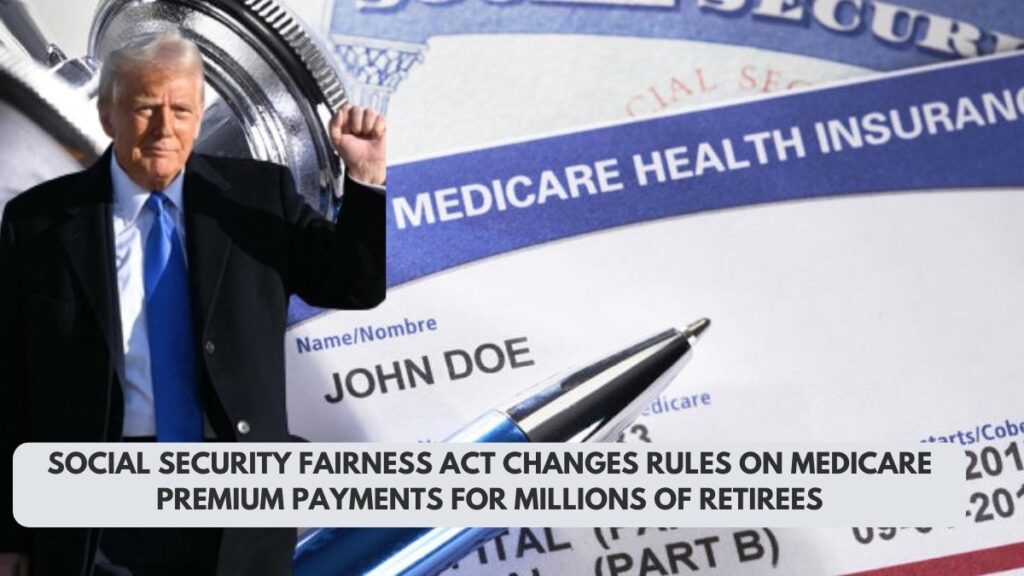A major change in federal law could significantly affect how millions of Americans—particularly public sector retirees—pay their Medicare premiums.
The recently passed Social Security Fairness Act (SSFA) aims to undo long-standing provisions that reduced Social Security benefits for certain workers, and it may automatically change how some enrollees pay their Medicare Part B and Part D premiums.
What Changed?
The SSFA repeals two controversial rules: the Windfall Elimination Provision (WEP) and the Government Pension Offset (GPO).
These provisions had reduced Social Security benefits for individuals who earned pensions through employment not covered by Social Security, such as teachers, police officers, and other public servants.
As a result of the repeal, thousands—if not millions—of retirees are seeing increased Social Security benefit payments. But the impact doesn’t stop there. For some, this adjustment changes how their Medicare premiums are paid.

How Medicare Premium Payments May Change
1. Automatic Deductions from Social Security
If your newly adjusted Social Security benefit is large enough to cover Medicare premiums, you may no longer need to pay those premiums out of pocket. Instead, the premium amount will be automatically deducted from your monthly Social Security check.
This includes:
- Medicare Part B (Medical Insurance)
- Medicare Part D (Prescription Drug Coverage)
This deduction process streamlines the payment method, reducing the chance of missed payments and ensuring uninterrupted coverage.
2. Direct Billing Will Continue for Some
If your Social Security benefit still does not cover the full cost of Medicare premiums, the Centers for Medicare & Medicaid Services (CMS) will continue to bill you directly. Nothing changes unless the SSA explicitly informs you.
What Retirees Need to Do
The SSA and CMS recommend the following actions to ensure a smooth transition:
➤ Continue Paying as Usual Until Notified
Do not assume your premiums will be deducted automatically. Wait until you receive official communication from SSA or CMS.
➤ Adjust Automatic Payments
If you use Medicare Easy Pay or an online banking bill pay service, make sure to stop those payments once SSA begins deducting premiums. Otherwise, you could end up double-paying.
➤ Request Refunds for Overpayments
If you prepay and then premiums are deducted automatically, you’re entitled to a refund. SSA will issue refunds or credit the balance to your account. Stay in touch with SSA if you think you’ve overpaid.
Could This Impact Your Medicare Costs Long-Term?
Possibly. The Income-Related Monthly Adjustment Amount (IRMAA) could be affected by your newly increased Social Security benefits. IRMAA applies to high-income individuals and increases their Medicare Part B and D premiums.
If your annual income crosses certain thresholds due to benefit increases, you might fall into a higher IRMAA bracket, leading to higher premiums.

Who Benefits the Most from the SSFA?
The repeal of WEP and GPO primarily benefits:
- Retired teachers, firefighters, police officers
- Government workers with pensions not covered by Social Security
- Surviving spouses of those retirees
These groups had long called for reform, claiming the rules unfairly penalized their retirement benefits.
Stay Informed, Stay Protected
With so many changes underway, it’s more important than ever to:
- Review your Social Security award letters
- Check CMS and SSA communications
- Contact SSA or a trusted financial advisor if unsure
Final Thoughts
The Social Security Fairness Act is a significant win for many retirees, not only boosting benefits but potentially simplifying how Medicare premiums are paid. But with every change comes the need for careful monitoring.
If you’re affected by WEP or GPO, or if you’re unsure how your Medicare premiums are currently paid, now is the time to take a closer look. The SSA is expected to continue rolling out updates and notifications throughout 2025.
Stay informed, keep your records updated, and talk to an advisor if you have questions. The retirement landscape is shifting—make sure you’re on solid footing.
This article has been carefully fact-checked by our editorial team to ensure accuracy and eliminate any misleading information. We are committed to maintaining the highest standards of integrity in our content.

Himanshu Sharma writes for Weekend Spy, focusing on recruitment, government schemes, and current affairs. He is dedicated to making complex information accessible to readers.
Himanshu enjoys playing chess, hiking, and trying new recipes, always seeking ways to combine his love for writing with his passion for exploration. Connect with Drop him an email at [email protected].







